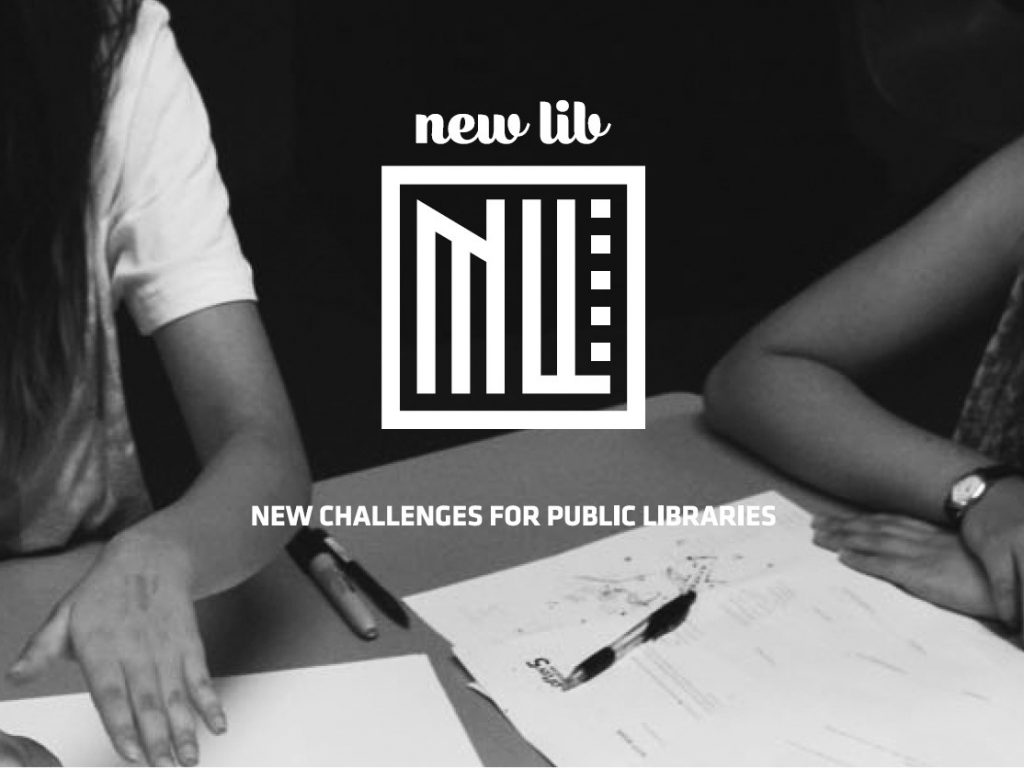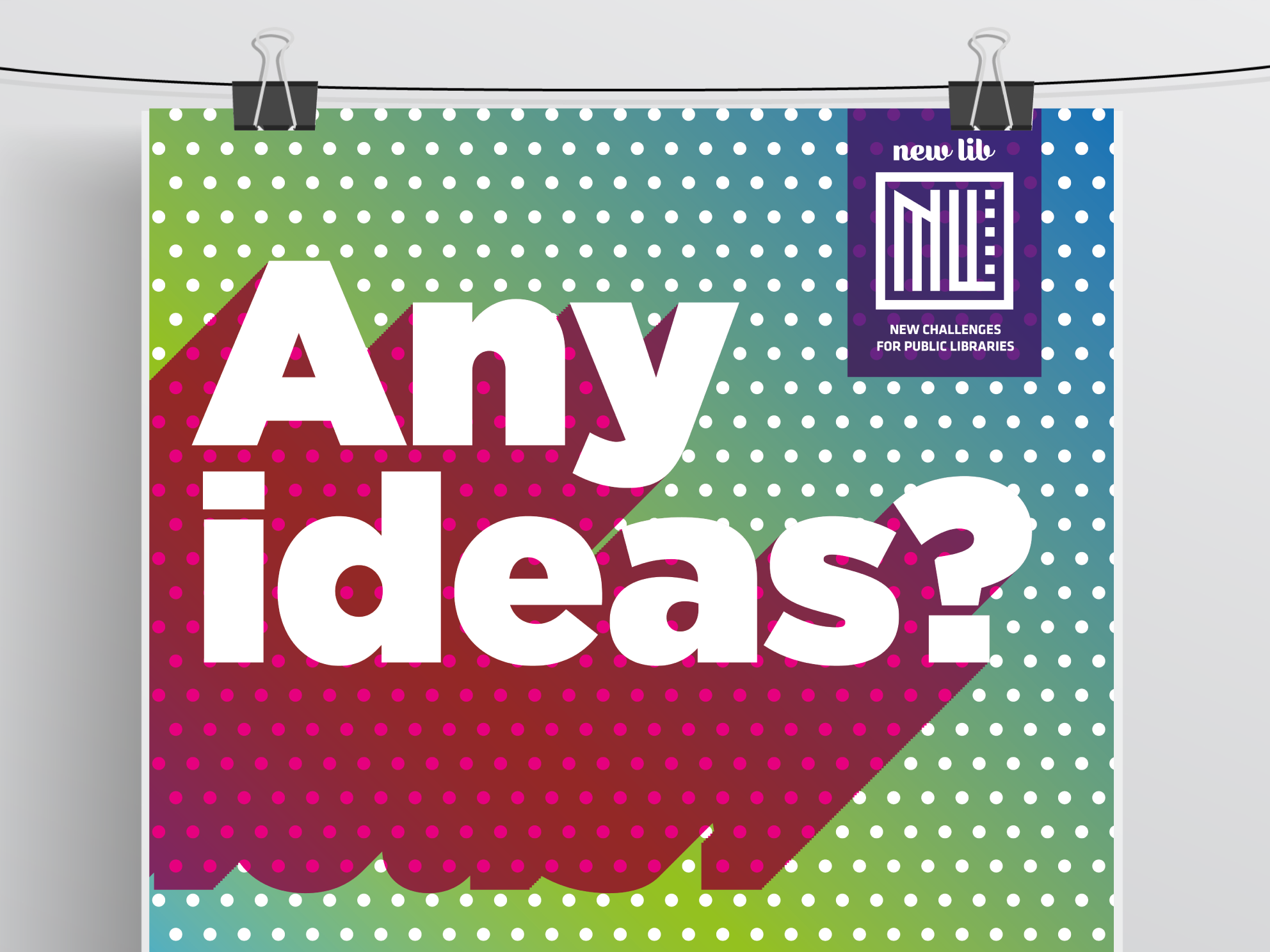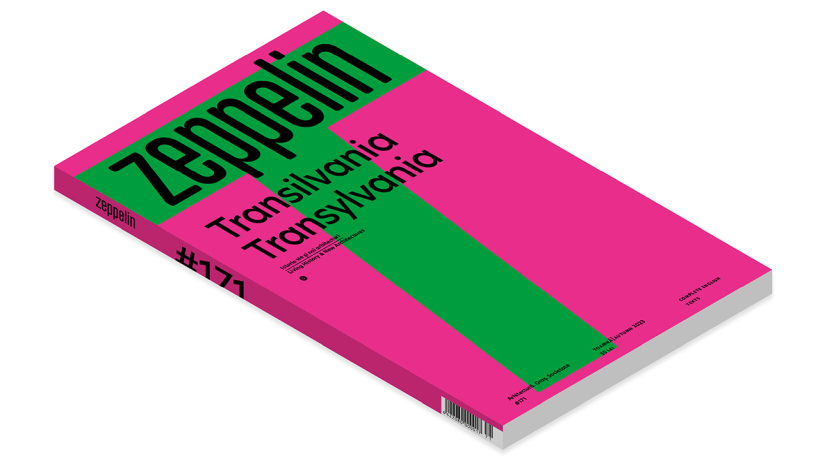Are you willing to change the future of libraries transforming them in public hub? Are you a designer or a reporter with a passion for the human centered design approach? Answer to this call and participate in the selections of the best designers and reporters for 5 LIB#LAB with libraries in Europe promoted by the European project New Libraries.
The libraries are the dream spaces for any designer and storyteller.
It is a space for free and equal access for all, it is a place where you will meet all kinds of different people young and old, high and low – so designing a service or learning program does not get any more meaningful than that! The roles and spaces surrounding the libraries are shifting and changing radically in these years. Designers, small start-ups and finally citizens stand to benefit mutually if they seize the opportunity.
This is a chance to be heard, to give direction to the change and to learn new skills.
If you are selected, you’ll take part to the Design Thinking for Libraries process (LIB#LAB), a unique set of activities (learning, networking, designing, storytelling, prototyping etc.) with the aim to apply the human centered design methodology in the innovation of services for 5 libraries in European cities: Arese, Pero and Vanzago in Italy, Braga (Portugal), Ploiesti (Romania).
1. THE PROJECT NEW LIB
New Challenges for Public Libraries (NEW LIB) aims to create a transnational community of public libraries active in the European countries involved, in order to share good practices
and test the design thinking approach (also called human centred design methodology), for conceptualizing innovative services and the active involvement of the citizens (audience).
The project aims to set up transnational models for the development of creative, sustainable and effective solutions for public libraries facing the challenges of the “Information Society” and for a wider participation of all social groups – as actors and users – in the design and delivery of services more linked to needs of the local communities. This because design thinking processes (as successfully exploited in other fields) can efficiently support the challenges faced by libraries in the digital era. An innovative and participative approach, which can thrive also thanks to partnership with cultural and creative industries.
2. DESIGN THINKING FOR LIBRARIES
Some libraries have shifted their approach and perspective to adapt to 21st century needs. For instance, libraries are continually re-framing their purpose and offerings based on the library
as a hub of citizen services, a co-working space, and a platform for experimentation. NEW LIB project would improve this concept applying the “Design Thinking for Libraries. A toolkit for patron-centered design” developed by IDEO in partnership with the Arhus City. The toolkit is a way of working that will help designers strengthen libraries by understanding the needs of people and engaging communities like never before through a method of design thinking.
Several other sectors, particularly business and education, have used this people-focused
approach for decades to solve problems. IDEO has adapted these methods for the library setting and designers will learn the steps to develop better services, tools, and experiences for people.
3. NEW LIB#LAB
LIB#LAB (according to the IDEO toolkit) is a set of activities in three main areas: INSPIRATION, IDEATION, ITERATION. Each LIB#LAB will engage: 1 designer, 1 reporter, 1 Librarian, 1 tutor, 1 mentor and local citizens. The activities foreseen will be:
1. Start-up: definition of the design challenges. The teams will work on the start up of the
project, with a training session, with a session of sharing best practices and focusing the target;
2. Inspiration: this phase aims to frame the design challenge based on the user’s needs to find
new perspectives on the opportunity and engaging the librarians and the selected target groups;
3. Ideation: the results of the inspiration phase will be the input to generate ideas and make
them tangible (prototyping);
4. Iteration: get feedback from the users on the prototype and evolve it will be the core of the
whole process.
5. Getting to scale: to make the project idea from the prototype to a more advanced version of
the service/product service system; each team will be supported in find a sustainable way to
develop the service finding sponsors, investors, etc.
6. Communication: storytelling and presentation for the final event @ Milano Design Week 2018.
The Libraries involved are 5 in 3 countries (Italy, Portugal and Romania):
Pero (Italy): not just a library, but an innovative cultural center that provides access to many facilities tailored for different audiences. PuntoPero and PuntoCerchiate are actually at
the same time: an information point of municipal and regional services, a games room with consoles and board games, an auditorium event room, a newstand, a room for studing, an event management center, courses, trips and more. An open and stimulating space where everyone can find something exciting: even a piano to play in the free time!
ilPertini Cultural Center – Cinisello Balsamo (Italy): opened in September 2012, ilPertini is the “square of the knowledge” of the city of Cinisello Balsamo: a welcoming environment in which you can learn, meet your friends, surf the internet (WiFi), listen to music, play with your children.
A different space from a traditional library, with many rooms to house courses, workshops and cultural events and plenty of space to be utilized as needed.
Arese (Italy): a new bulding addressed to the library’s services in the middle of an urban park, inside the Arese sporting area. A precise choice to underline the connection between culture and enviroment, for a healthy way of life in the 21st century. The library will be opened during the month of december 2016 and it applies to become a landmark for CSBNO libraries.
Ploiesti (Romania): Nicolae Iorga County Library is a large institution and we serve over 200000 people in Ploiesti, and over 700000 people at the county level, we have over 500000 library units. Excepting traditional library services we have IT courses for adult, English for children, evening movies, chess for kids and workshops for teens.
Braga (Portugal): the Lúcio Craveiro da Silva’s Library is a public library that did open its door to the public in 21st of December of 2004 in Braga’s historical center in a 17th century
building with archaeological remains of the centuries II and I before Christ. It was designed to simultaneously accommodate 600 hundred users with different profiles. The library has 22.961 registered users, has about half a million of documents available in the online catalog (www.blcs.pt), makes an average of 6,000 loans per month, has an average of 35 activities per month for different audiences and works with various institutions in the field of culture, education and social intervention.
4. AWARD
Each designer and each reporter will have a maximum amount of 2.500 Euros for expenses occurred during the realization of the activities (travels, accommodation, materials, etc.). For design students (School of Design Politecnico di Milano): the project (service, product service system, etc.) developed under the LIB#LAB can be used for graduation (thesis). For reporter students (Bicocca University): the storytelling project developed under the LIB#LAB can be used for graduation (thesis). Who want to take advantage from this opportunity can explicit the interest in the motivation area of application format.
Designers and Reporters will also have:
_ Visibility on the platform of the European Project of NEW LIB (www.newlib.eu)
_ Free work place in the Libraries involved (like a coworking)
_ Certificate of experience in “Design Thinking for Libraries. A toolkit for patron-centered design”
developed by IDEO, becoming Ambassadors of this method in Libraries all over the world.
_ Visibility in the final event foreseen for the Milano Design Week 2018.
5. WHO CAN APPLY
Designers, service designers, architects with experience in user centered design (students or professionals); video makers, filmmakers and movie designers (students or professionals).
6. HOW TO APPLY
Applications should be submitted within December 15th, 2016. Designers and reporters can apply sending to the official e-mail info@newlib.eu the following documents:
_ cv in Europass format (point out the level of English knowledge) + portfolio + application form with motivation letter and indication of the selected Library (using the official format available on the NEW LIB website).
7. SELECTION
The selection of 5 designer and 5 reporters shall be done by a jury formed by the partners’ representatives of the NEW LIB project.
8. EVALUATION CRITERIA
The applications shall be considered eligible at the evaluation stage if:
– they provide all the information and documents required, by the expiry date of the call;
– they are submitted by an eligible applicant (see “Who can apply”).
The accepted applications shall be evaluated on the basis of the following criteria:
– background and professional experiences;
– special attention to the issues of social and environmental sustainability;
– communication and presentation skills;
– motivation.

For more information, explanations and support to the application, please contact:
info@newlib.eu / www.newlib.eu


